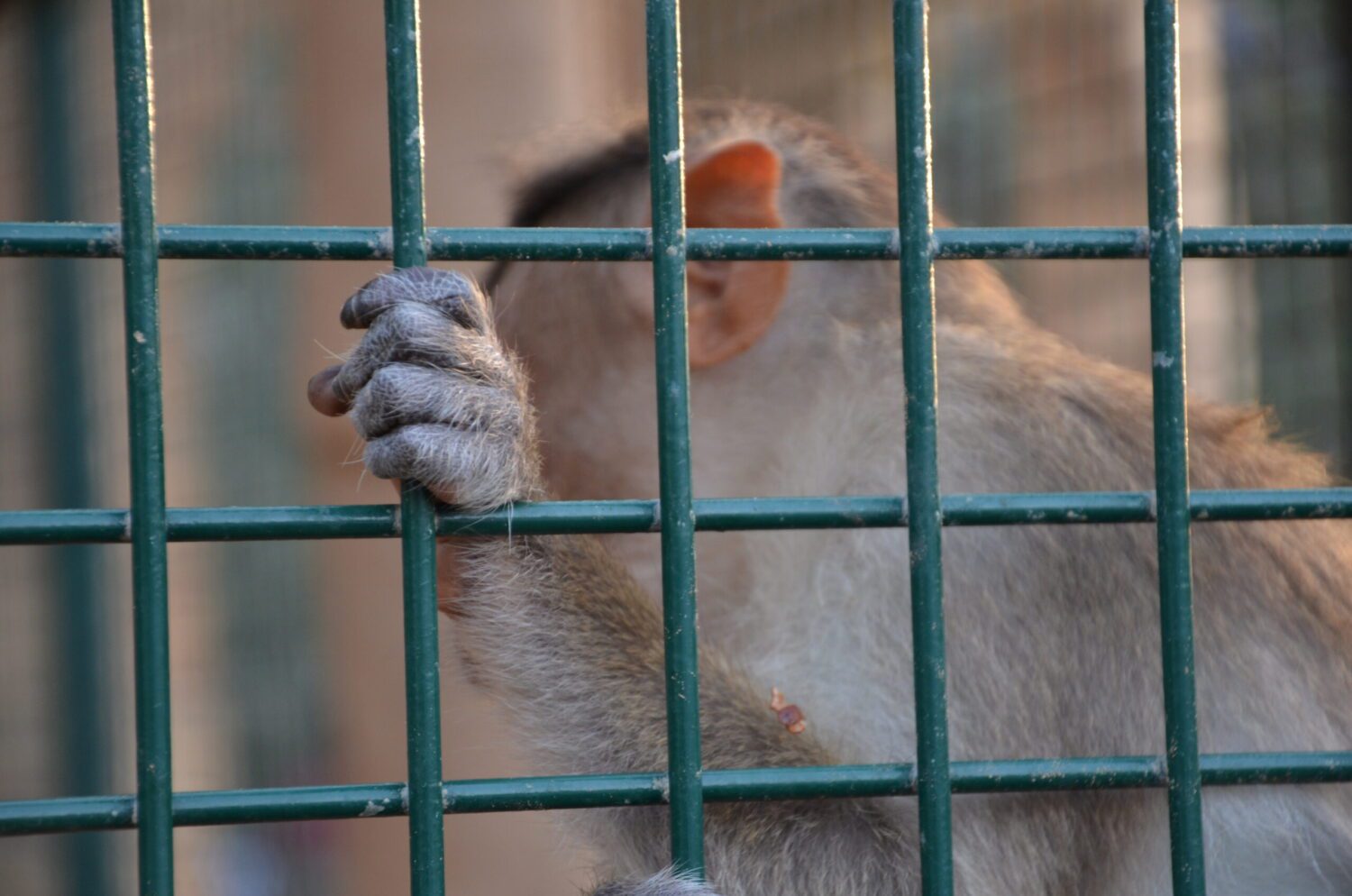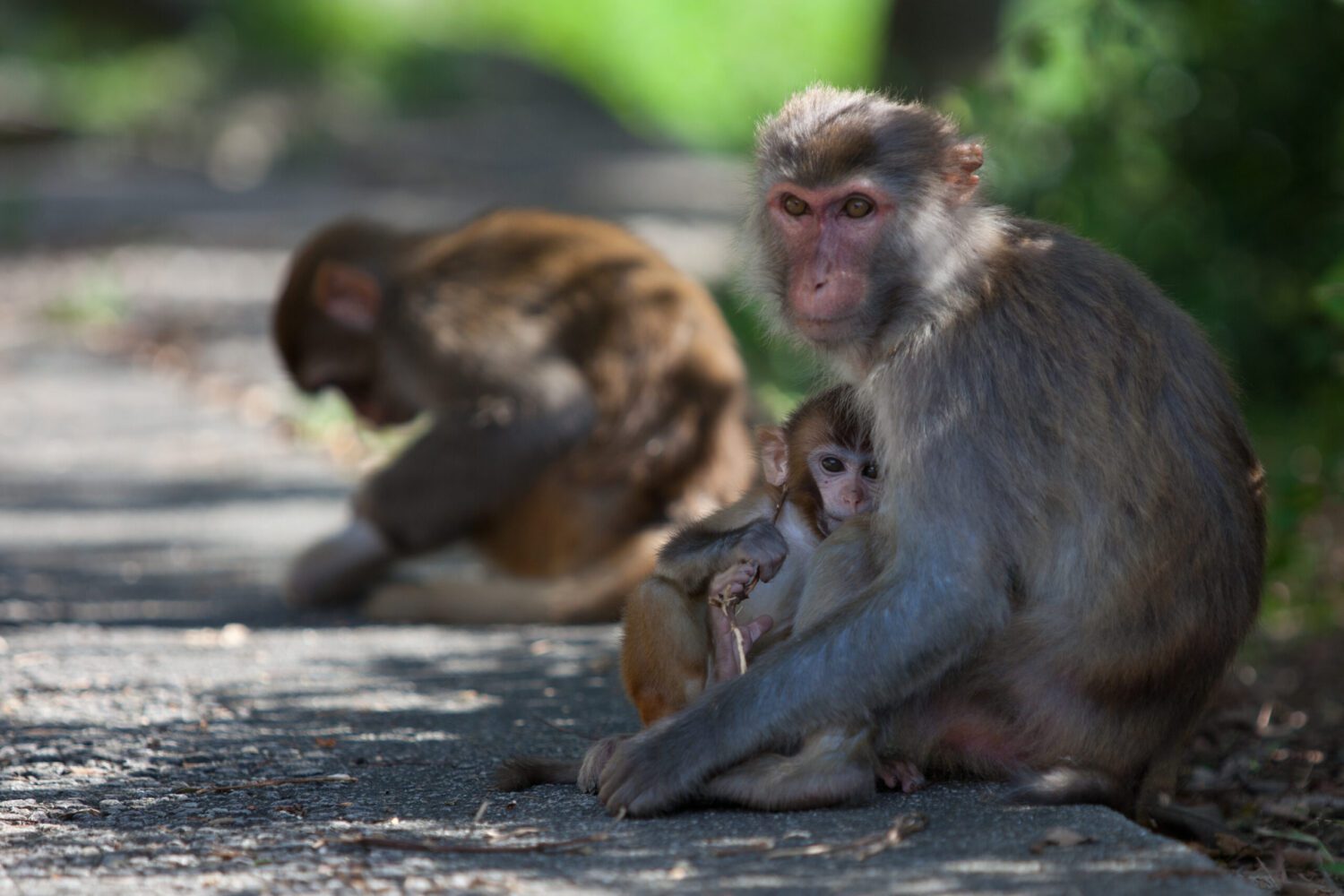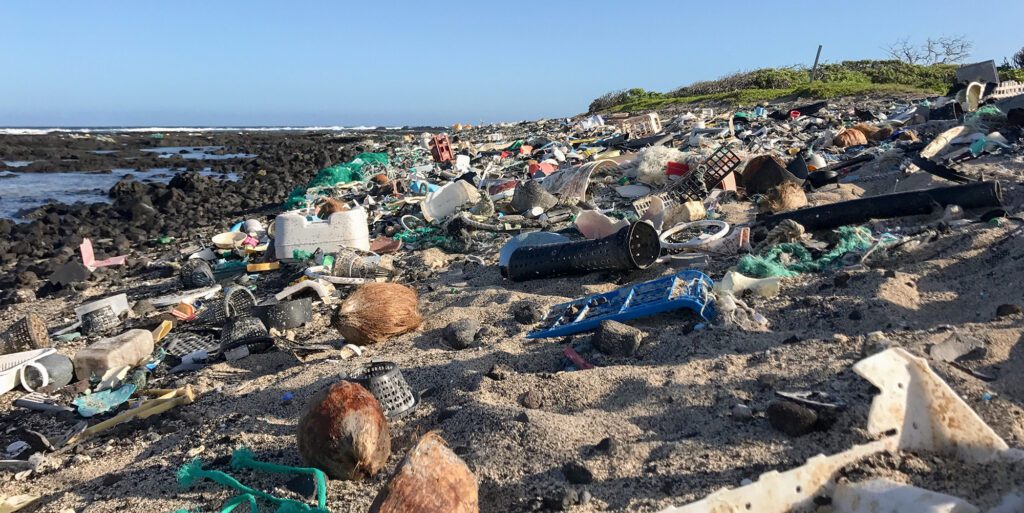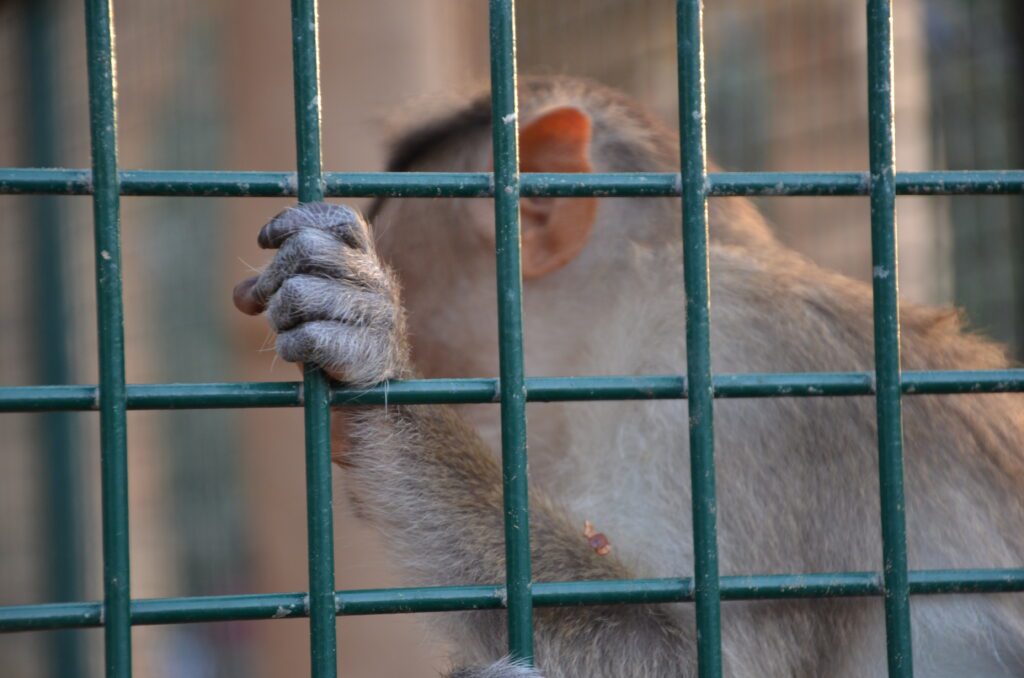


While the European Union votes to phase out animal research, the United States wants more.
By Reynard Loki, Independent Media Institute
6 min read
In the last two years, the U.S. National Institutes of Health (NIH) has invested nearly $29 million to breed more monkeys for biomedical research, with an additional $7.5 million to be spent by October. The investments, which include infrastructure improvements at the U.S. National Primate Research Centers (NPRCs), have been made in the wake of the COVID-19 pandemic, as researchers have been testing numerous vaccines on nonhuman primates, most commonly rhesus macaques (Macaca mulatta)—a species of Old World monkey commonly used to study infectious diseases—before human trials began.
Using the pandemic as the pretext, the Biden administration has proposed using even more taxpayer money to conduct primate research, suggesting a 27 percent funding increase for the NPRCs in its fiscal year 2022 budget request. If Congress gives the administration its stamp of approval, an additional $30 million would be given to the centers.
“We have been making investments to bring the levels up and to plan for the future,” James Anderson, director of the NIH Division of Program Coordination, Planning, and Strategic Initiatives in Bethesda, Maryland, told Nature. “What happens if [a pandemic] happens again, with another virus in three years? We want to be ready for that.”
“A couple of years ago, we were feeling the pinch,” Nancy Haigwood, director of the NPRC in Beaverton, Oregon, told Nature. Citing the pandemic, Haigwood said, “we are truly out of animals,” though Nature reports that the center she runs houses some 5,000 primates.
Animal rights advocates are rebuffing the proposed increase in funding, which would subject many more animals to cruel and deadly experiments. In an email to Earth | Food | Life, Barbara Stagno, president and executive director of Citizens for Alternatives to Animal Research and Experimentation (CAARE), an animal rights nonprofit organization based in New York, countered the claim that there is a dearth in primates for research. The group has launched a public petition urging Congress to reject the additional funding for primate research.
While the centers are claiming that there are not enough primates to conduct research, Stagno presented figures from the U.S. Department of Agriculture showing that the opposite is true. “In 2019 there were 40,269 monkeys held ‘on reserve,’ in addition to the 68,257 monkeys subjected to experiments,” said Stagno. “Not only were over 40,000 monkeys warehoused ‘on hold’ for use in experiments, but that number is a 14 percent increase from 2018, clearly demonstrating a growing surplus—not a shortage—of monkeys.”
“In contrast to the falsehoods being pushed by the primate centers, monkeys are not essential for COVID-19 research. In fact, due to vast differences in genetics and physiology, primates do not experience COVID-19 as humans do,” said Stagno.
In fact, scientists at the NIH concluded in 2015 that research on SARS and MERS, two strains of coronaviruses that crossed the species barrier to infect humans within the preceding 12 years, had been largely unsuccessful “in part because of difficulties in developing animal models that provide consistent and reproducible results.”
In addition, Stagno pointed out that the trajectory of the COVID-19 biomedical response actually proved that nonhuman animal testing for vaccines is unnecessary. “With the urgency imposed by the pandemic, key vaccine developers Pfizer and Moderna were given approval to run human trials ahead of normally required animal testing,” she said. “The result was that vaccines for COVID-19 were developed and made accessible to the public in record time, with less animal testing than ever before. In bypassing animal testing to evaluate the vaccines, the scientific community acknowledged that these tests are not scientifically predictive of human response, but rather are based on regulatory requirements that are a hindrance to rapidly developing safe and effective treatments.”
Indeed, as CAARE highlights, the most informative work addressing the COVID-19 pandemic comes from human-based science. Other organizations, notably the Physicians Committee for Responsible Medicine, a nonprofit animal rights group based in Washington, D.C., also strongly support alternatives to nonhuman animal research, arguing that the U.S. doesn’t need more monkeys for vaccine testing, but rather a new strategy altogether.
“Instead of monkeys and other animals, more ethical, effective, and sustainable human-based methods are the future,” the group says. “Because they use human cells and tissues, these approaches can better replicate the pathology of human diseases, including COVID-19… examples of powerful human-based COVID-19 research include studies that have used donated human tissue, human brain organoids, human lung airway chips, human stem cell-derived cardiac tissue, human intestinal organoids, and mini human lungs in a dish. Learning from these human-relevant findings and supporting much more of this kind of research is the only way we will solve this crisis and better prepare for future pandemics.”
Stagno criticized the federal government’s request for more funding for primate research by comparing the U.S. position to that of Europe. “At a time when the European Parliament voted [on September 15] to phase out animal experiments, the U.S. Department of Health and Human Services [under whose jurisdiction the NIH falls] is asking for another $30 million to expand primate research. This is totally out of step with where modern science needs to go.”
“While the past decade has seen amazing new developments in alternatives to animal testing, policymakers, regulators and parts of the scientific community are yet to fully recognize the potential of these new methods,” said Member of the European Parliament Tilly Metz. “The resolution we voted on today aims to accelerate the shift in mentalities, regulation and funding.” She added, “There are no excuses to perpetuate the current level of reliance on animal experiments. It is clear that an ambitious phase-out plan, with clear milestones and achievable objectives, is the next step needed to start reducing significantly the use of animals in science.” And while Europe is leading today’s charge to eliminate animal testing, animal welfare in general has also been gaining ground across Asia in recent years.
When it comes to cruel, deadly and unnecessary experiments, particularly on our close evolutionary cousins, it’s time for the United States to get in sync with modern science. Congress shouldn’t just reject additional funding for primate research—it should ban it altogether.
###
Reynard Loki is a writing fellow at the Independent Media Institute, where he serves as the editor and chief correspondent for Earth | Food | Life. He previously served as the environment, food and animal rights editor at AlterNet and as a reporter for Justmeans/3BL Media covering sustainability and corporate social responsibility. He was named one of FilterBuy’s Top 50 Health & Environmental Journalists to Follow in 2016. His work has been published by Yes! Magazine, Salon, Truthout, BillMoyers.com, Counterpunch, EcoWatch and Truthdig, among others.
Take action…

Urge Congress to reject funding expanding primate experiments in the 2022 Department of Health and Human Services budget. (CAARE)
Cause for concern…

Pesticide residues have been found on around 70 percent of non-organic produce, according to Environmental Working Group, which has published the Shopper’s Guide to Pesticides in Produce, ranking the pesticide contamination of 46 popular fruits and vegetables.
- Shopper’s Guide to Pesticides in Produce (Environmental Working Group)
- U.S. climate plans in flux as Democrats eye reconciliation deal (Emma Dumain, Geof Koss, Nick Sobczyk and Jeremy Dillon, E&E News)
- COP26 climate talks won’t fulfill aims of Paris agreement, leaders warn (Fiona Harvey, Guardian)
- Australian prime minister refuses to commit to phasing out fossil fuels (Melanie Burton, Reuters)
- Today’s kids will live through three times as many climate disasters as their grandparents, study says (Sarah Kaplan, Washington Post)
Round of applause…

- ‘A lot of impatience’: Youth climate protesters return to the streets (Laurie Goering and Nita Bhalla, Thomson Reuters Foundation)
- 21 states urge EPA to toughen vehicle emissions rewrite (David Shepardson, Reuters)
- Landsat-9: ‘Satellite of record’ launches to picture Earth (Jonathan Amos, BBC News)
- Five ways going vegan could change your social life—not just your health (Catherine Oliver, WalesOnline)
- Mama bear teaches cub how to use slide in unbearably cute video (Ron Dicker, HuffPost)
What we’re watching

Directed by award-winning nonfiction filmmaker Elizabeth Lo, “Stray” (Magnolia Pictures, 2021) follows the lives of three stray dogs wandering through the streets of Istanbul as they search for food and shelter. The film explores what it means to have no legal status, safety or security.
“A simple work of genius,” said director Michael Moore. “I have never seen a feature film like this. The dogs are not being used by the human filmmakers to tell a human story—we are here to let the dogs tell us their story, even if we haven’t a clue what’s going on inside their heads.”
Watch the “Stray” trailer on YouTube.
Watch “Stray” film on Amazon Prime.
ICYMI…

“The natural world is in a state of crisis, and we are to blame. We are in the midst of the Sixth Extinction, the biggest loss of species in the history of humankind. So many species are facing total annihilation. Nearly one-third of freshwater species are facing extinction. So are 40 percent of amphibians; 84 percent of large mammals; a third of reef-building corals; and nearly one-third of oak trees. Rhinos and elephants are being gunned down at rates so alarming that they could be completely wiped out from the wild by 2034. There may be fewer than 10 vaquita—a kind of porpoise endemic to Mexico’s Gulf of California—due to illegal fishing nets, pesticides and irrigation. There are 130,000 plant species that could become extinct in our lifetimes. All told, about 28 percent of evaluated plant and animal species across the planet are now at risk of becoming extinct.”
—Reynard Loki, “If We Don’t Protect 30 Percent of the Natural World by 2030, Earth May Be Unfit for Life” (EcoWatch, May 24, 2021)
Parting thought…

“Do you remember the pine that stood on the bank of the Arc, lowering its leafy head over the chasm that opened at its feet? That pine protected our bodies with its foliage from the heat of the sun, ah! May the Gods preserve it from the fatal blow of the woodcutter’s axe!” —Paul Cézanne, in a letter to Émile Zola
Earth | Food | Life (EFL) explores the critical and often interconnected issues facing the climate/environment, food/agriculture and nature/animal rights, and champions action; specifically, how responsible citizens, voters and consumers can help put society on an ethical path of sustainability that respects the rights of all species who call this planet home. EFL emphasizes the idea that everything is connected, so every decision matters.
Click here to support the work of EFL and the Independent Media Institute.
Questions, comments, suggestions, submissions? Contact EFL editor Reynard Loki at [email protected]. Follow EFL on Twitter @EarthFoodLife.

